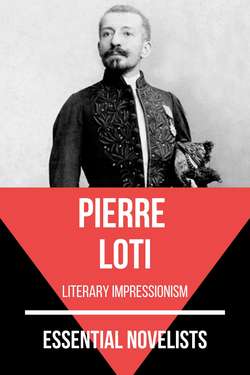Читать книгу Essential Novelists - Pierre Loti - Pierre Loti, August Nemo, John Dos Passos - Страница 37
На сайте Литреса книга снята с продажи.
CHAPTER XXX. A LITTLE DOMESTIC DIFFICULTY
Оглавление––––––––
AUGUST 12TH.
The Y——and Sikou-San couple were divorced yesterday. The Charles N—-and Campanule household is getting on very badly. They have had some trouble with those prying, grinding, insupportable little men, dressed up in gray suits, who are called police agents, and who, by threatening their landlord, have had them turned out of their house (under the obsequious amiability of this people lurks a secret hatred toward Europeans)—they are therefore obliged to accept their mother-in-law’s hospitality, a very disagreeable situation. And then Charles N—-fancies his mousme is faithless. It is hardly possible, however, for us to deceive ourselves: these would-be maidens, to whom M. Kangourou has introduced us, have already had in their lives one adventure, at least, and perhaps more; it is therefore only natural that we should have our suspicions.
The Z——-and Touki-San couple jog on, quarrelling all the time.
My household maintains a more dignified air, though it is none the less dreary. I had indeed thought of a divorce, but have really no good reason for offering Chrysantheme such a gratuitous affront; moreover, there is another more imperative reason why I should remain quiet: I, too, have had difficulties with the civilian authorities.
The day before yesterday, M. Sucre, quite upset, Madame Prune, almost swooning, and Mademoiselle Oyouki, bathed in tears, stormed my rooms. The Nipponese police agents had called and threatened them with the law for letting rooms outside of the European concession to a Frenchman morganatically married to a Japanese; and the terror of being prosecuted brought them to me, with a thousand apologies, but with the humble request that I should leave.
The next day I therefore went off, accompanied by “the wonderfully tall friend”—who expresses himself in Japanese better than I—to the registry office, with the full intention of making a terrible row.
In the language of this exquisitely polite people, terms of abuse are totally wanting; when very angry, one is obliged to be satisfied with using the ‘thou’, a mark of inferiority, and the familiar conjugation, habitually used toward those of low birth. Sitting upon the table used for weddings, among the flurried little policemen, I opened the conversation in the following terms:
“In order that thou shouldst leave me in peace in the suburb I am inhabiting, what bribe must I offer thee, oh, little beings more contemptible than any mere street porter?”
Great and general dismay, silent consternation, and low bows greet my words.
They at last reply that my honorable person shall not be molested, indeed, they ask for nothing better. Only, in order to subscribe to the laws of the country, I ought to have come here and given my name and that of the young person that—with whom—
“Oh! that is going too far! I came here for that purpose, contemptible creatures, not three weeks ago!”
Then, taking up myself the civil register, and turning over the pages rapidly, I found my signature and beside it the little hieroglyphics drawn by Chrysantheme:
“There, idiots, look at that!”
Arrival of a very high functionary—a ridiculous little old fellow in a black coat, who from his office had been listening to the row:
“What is the matter? What is it? What is this annoyance put upon the French officers?”
I state my case politely to this personage, who can not make apologies and promises enough. The little agents prostrate themselves on all fours, sink into the earth; and we leave them, cold and dignified, without returning their bows.
M. Sucre and Madame Prune may now make their minds easy; they will not be disturbed again.
